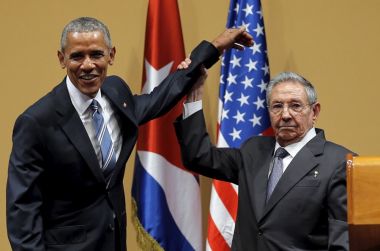Cuban police beat, arrest pro-democracy protesters in Havana 2 days after historic Obama state visit

Two days after U.S. President Barack Obama addressed Cubans about the importance of human rights and peaceful dialogue, pro-democracy demonstrators in Havana were beaten and arrested by Cuban police just steps away from where Obama had spoken on Tuesday, according to Yahoo News.
The protest was held on Thursday just three blocks from the Grand Theater of Havana, where Obama spoke live to the Cuban nation. It was quickly broken up by plainclothes officers, who attacked demonstrators violently, hauling those they had captured into police cars.
During his historic visit to Cuba on Sunday, March 19, Obama dared the Cuban government to relax its grip on politics and society to enable its citizens to realise their full potential.
Obama said the purpose of his visit to Cuba was to "extend a hand of friendship" and "bury the last remnant" of Cold War in the Americas. Cuban President Raul Castro was in attendance during the speech.
Obama was the first American president to visit Cuba in nearly a century and the first since a revolution led by Fidel Castro toppled a U.S.-backed strongman in 1959.
"I believe citizens should be free to speak their minds without fear. Voters should be able to choose their governments in free and democratic elections," Obama told the audience on the final day of his visit, according to Reuters.
"Not everybody agrees with me on this, not everybody agrees with the American people on this but I believe those human rights are universal. I believe they're the rights of the American people, the Cuban people and people around the world," Obama said.
The U.S. president also officially announced the lifting of the longstanding U.S. economic embargo against Cuba and praised the Cuban talents and the country's achievements in healthcare and education.
The speech was broadcast live into homes across the island, reports said.
The two countries started their rapprochement 15 months ago and since then, Obama has used his executive powers to relax trade and travel restrictions on Cuba and accelerate cautious market-style reforms introduced by Castro to allow greater political and economic freedom.
Castro welcomed Obama's moves while insisting that a new relationship with the old enemy does not mean Cuba plans to change its political system, reports said.
Earlier, some groups lobbying against Christian persecution in the communist nation held a prayer vigil in front of the White House calling for religious freedom.
Christian activists led by Rev. Patrick Mahoney, director of the Christian Defense Coalition and lead pastor of the Church on the Hill, said more than 100 churches in Cuba have been demolished and 2,000-plus churches closed in recent acts of persecution against Cuban Christians.
"We stand in solidarity with our persecuted brothers and sisters, and call upon the President to publicly speak out against this crushing of religious freedom and human rights. We cannot be silent," he said.
"The Obama government cannot move forward to normalise relations with Cuba while these gross violations of human rights and religious freedoms are still in place."











